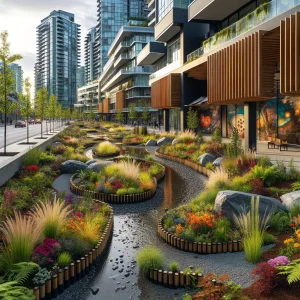As businesses and communities across British Columbia welcome the rejuvenating season of spring, the emphasis on sustainable practices in commercial landscaping has never been more critical. Moreover, integrating eco-friendly landscaping methods enhances the aesthetic appeal of commercial spaces and plays a pivotal role in preserving environmental health. This blog post explores the significance of sustainable landscaping, introduces rain gardens, composts, and the use of native plants, and provides tips on organic pest control and natural fertilizers, all within the context of British Columbia’s unique climate and ecosystem.
The Importance of Sustainable Landscaping
Sustainable landscaping is an approach that seeks to minimize environmental impact and support the natural ecosystems. Importantly, the need for such practices is paramount in British Columbia, where diverse ecosystems, from coastal rainforests to arid interior landscapes, exist. Consequently, sustainable landscaping helps conserve water, reduce chemical runoff, enhance biodiversity, and contribute to carbon sequestration efforts—vital in combating climate change.
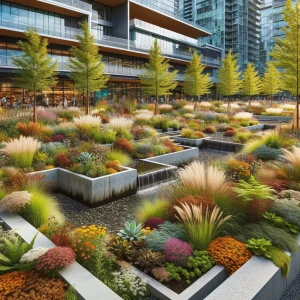
Rain Gardens: A Case for Water Conservation
Rain gardens are aesthetically pleasing and engineered to absorb and filter runoff water from impervious surfaces. Additionally, rain gardens have been successfully implemented in commercial settings across British Columbia, from Vancouver’s urban centers to the more arid regions of Kelowna. Thus, these gardens reduce the burden on our stormwater systems and support local wildlife and plant biodiversity.
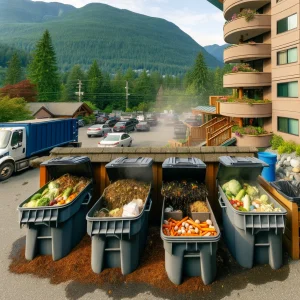
Composting: Turning Waste into Resource
Composting is a sustainable practice, turning organic waste into a valuable resource for landscaping. Similarly, commercial entities, including hotels and restaurants in British Columbia, have adopted composting to manage waste effectively. As a result, by converting organic waste into nutrient-rich compost, businesses can reduce their environmental footprint and supply natural fertilizer for their gardens and landscapes.
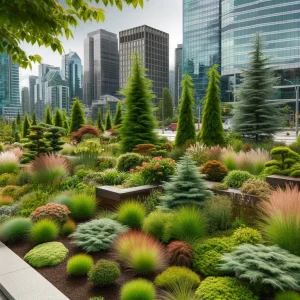
Native Plants: The Heart of Sustainable Landscaping
Using native plants in commercial landscaping is crucial for the health of British Columbia’s ecosystems. Equally important, native plants are adapted to the local climate and soil conditions, requiring less water and no chemical fertilizers or pesticides. For instance, examples like the Western Red Cedar and the Pacific Dogwood embody our region’s natural beauty and support local wildlife. Therefore, incorporating these plants into commercial landscapes ensures resilience and sustainability.

Organic Pest Control and Natural Fertilizers
Transitioning to organic pest control methods and natural fertilizers is essential for sustainable landscaping. In British Columbia, businesses are turning to solutions like neem oil, beneficial insects, and compost tea to manage pests and enrich the soil without harming the environment. This approach ensures that commercial landscapes are eco-friendly, promoting biodiversity and reducing chemical runoff into our waterways.
Implementing Sustainable Practices: Tips and Tricks
For businesses in British Columbia looking to adopt sustainable landscaping practices, it’s advisable to start with thoroughly assessing your current landscape and practices. Consider implementing rain gardens in areas prone to runoff, start a composting program for your organic waste, and gradually transition to native plants and organic maintenance methods. Additionally, engage with local environmental organizations for guidance and support, and remember, the shift to sustainability is a journey that benefits not just your business but the entire community.
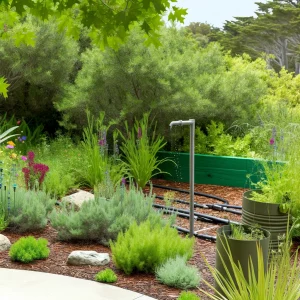
The Impact of Sustainable Landscaping in British Columbia
Adopting sustainable landscaping practices across commercial spaces in British Columbia has shown promising results. Statistically speaking, environmental organizations indicate a significant reduction in water usage, chemical runoff, and waste production among businesses implementing these practices. Moreover, these landscapes have become sanctuaries for local wildlife, contributing to biodiversity and environmental resilience.
In conclusion, as British Columbia continues to lead in environmental stewardship, the role of sustainable landscaping in commercial spaces cannot be understated. By adopting practices such as rain gardens, composting, and the use of native plants, along with organic pest control and natural fertilizers, businesses can contribute to a healthier planet. Let this spring be the season we commit to sustainable landscaping practices, setting a precedent for environmental responsibility and stewardship in the commercial sector.
